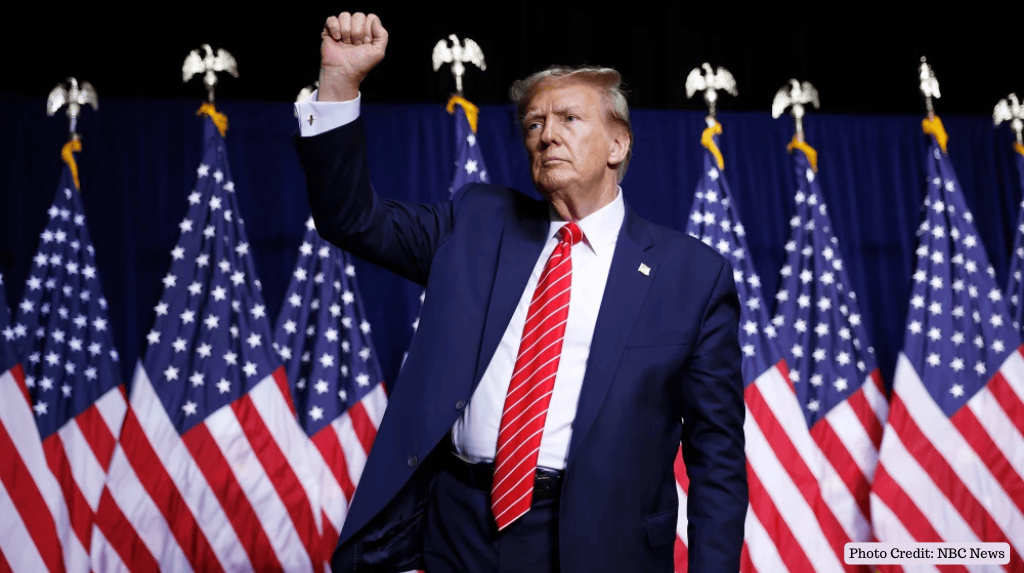Donald Trump has put forward the idea of offering cards to international students graduating from American universities as a departure from his usual strict immigration policies stance. In an interview on The All In Podcast show, he recommended that graduates from community colleges to Ph.D holders should be given cards alongside their degrees to keep their talent in the U.S. He voiced worries about educated graduates leaving America and boosting economies in other countries such as India and China.
However, Trump’s campaign promptly clarified that this plan would involve screening. According to his spokesperson Karoline Leavitt, only individuals who are graduates and can offer substantial contributions to the U.S. would be eligible. The screening process is intended to reject those who are not in line with principles or may pose a threat, such as individuals affiliated with communism radical Islamism, Hamas supporters, anti-American sentiments, and those reliant on public assistance. The details of the policy are still vague regarding how these graduates will be assessed and put into effect. This is especially uncertain considering Trump’s focus on limiting immigration.
This proposal contrasts with Trump’s broader immigration platform for 2024, which continues to focus on deportations and strict border controls. While the idea of retaining foreign graduates aligns with a pro-business perspective, the policy’s alignment with his record and broader goals on immigration is complex, and its practical application would depend on further developments.
Past Policies on Green Cards for Foreign Graduates in the U.S.
Historically, foreign graduates in the U.S. have had limited pathways to permanent residency. The most common route has been through employment-based green cards, which are often contingent on employer sponsorship. The Immigration and Nationality Act (INA) provides several employment-based categories (EB-1, EB-2, EB-3), but these categories have stringent requirements and are subject to annual caps, leading to long waiting times for many applicants. In the past, policies such as Optional Practical Training (OPT) allowed international students to work in their field of study for up to 12 months post-graduation, with a possible extension for STEM graduates. However, transitioning from OPT to a green card often requires finding an employer willing to sponsor the applicant through the complex immigration process.
Comparison with Proposals from Previous Administrations
Various administrations have proposed changes to improve pathways for foreign graduates. For instance:
- Obama Administration: Proposed reforms aimed at retaining STEM graduates through initiatives like the “Startup Visa” concept, which would allow foreign entrepreneurs to start businesses in the U.S. with more straightforward paths to residency.
- Trump Administration: Focused on tightening immigration policies, making it more challenging for foreign graduates to transition from student visas to employment-based green cards.
- Biden Administration: Has indicated a willingness to reform immigration policies to attract and retain talent, including discussions around providing clearer pathways for international students and graduates.
Key Features of the Proposal
Eligibility Criteria
- Which Graduates Qualify: The proposal primarily targets foreign graduates who have obtained degrees in STEM fields (Science, Technology, Engineering, Mathematics) from accredited U.S. institutions. It may also include those who have completed advanced degrees in other critical areas.
- Specific Institutions or Programs: The proposal is likely to focus on graduates from recognized universities and programs that contribute significantly to innovation and economic growth in the U.S.
Proposed Benefits
- How Will This Affect Foreign Graduates?: The proposal aims to provide a more streamlined pathway for foreign graduates to obtain green cards, allowing them to remain in the U.S. after completing their studies. This change could reduce uncertainty and enhance job security for international students.
- Implications for the U.S. Workforce and Economy: By retaining talented graduates, the U.S. can strengthen its workforce in high-demand sectors, fostering innovation and economic growth. This influx of skilled workers can help fill gaps in industries facing labor shortages and drive advancements in technology and research.
Implementation Details
- Timeline for Rollout: While specific timelines were not detailed in the proposal, stakeholders anticipate that implementation could occur within a few years if legislative support is secured.
- Administrative Process and Challenges: Implementing such a policy would require coordination between various government agencies, including USCIS and the Department of Labor. Challenges may include establishing eligibility criteria, processing applications efficiently, and addressing potential opposition from those favoring stricter immigration controls.
How Law and Visas Can Help?
At Law and Visas, our team of expert immigration consultants is here to make your travel to the US straightforward and successful. Whether you’re applying for a Green Card, Visitor Visa, or Study Visa, we handle every step, from preparing your application to gathering the required documents.
Our immigration Consultants and Lawyers ensure that your application meets the highest standards, with no details missed. We’ll also keep you informed throughout the process and coordinate with the immigration office or embassy on your behalf.
Law and Visas has a strong record of helping clients secure the visas/permits they need in the US. Call us today at +234 812 5505 986 to learn how we can assist you.





